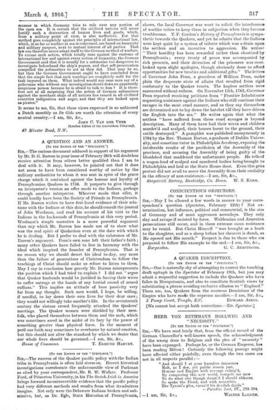A QUESTION AND AN ANSWER.
[To MR EDITOR OF THE " SpEoreroa.1 Sm,—The curious document adduced in support of his argument by Mr. D. G. Barron in your issue of February 26th will doubtless receive attention from others better qualified than I am to deal with it. It may, however, be pointed out that it does not seem to have been considered worthy of notice by the military authorities to whom it was sent in spite of the grave charge which it contained against the honour and loyalty of Pennsylvanian Quakers in 1758. It purports to give through an interpreter's version an offer made to the Indians, perhaps through another interpreter. Whoever made that offer, it could hardly have been the Society of Friends in Pennsylvania. If Mr. Barron wishes to have first-hand evidence of their rela- tions with the Indians at this date, he should consult the journal of John Woolman, and read his account of his visit to the Indians in the backwoods of Pennsylvania at this very period. Woolman's simple narrative is a more powerful argument than any which Mr. Barron has made use of to show what was the real spirit of Quakerism even at the date with which he is dealing. But I prefer to deal with the substance of Mr. Barron's argument. Penn's own sons left their father's faith ; many other Quakers have failed to live in harmony with the ideal which inspired the founder of Pennsylvania. That is no reason why we should desert his ideal to-day, any more than the failure of generations of Christendom to follow the teachings of Christ should make us rofuse to listen to them. May I say in conclusion how gravely Mr. Barron misrepresents the position which I had tried to explain ? I did not " argue that Quaker husbands would be justified in leaving their wives to suffer outrage at the hands of any bestial crowd of armed ruffians." This implies an attitude of base passivity very far from my thought. Such men would, I hope, be willing, if needful, to lay down their own lives for their dear ones ; they would not willingly take another's life. In the seventeenth century the riotous crowd frequently attacked the Quakers' meetings. The Quaker women were shielded by their men- folk, who placed themselves between them and the mob, which was sometimes awed in the midst of its fury by the power of something greater than physical force. In the moment of peril our faith may sometimes be overborne by natural emotion, but this should not alter the standard by which we desire that our whole lives should be governed.—I am, Sir, &c.,


































 Previous page
Previous page